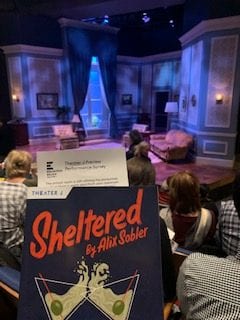An estimated 2.2% of the population of US adults consider themselves culturally or religiously Jewish.[1] Of those 5.3 million people, around 250,000 adults live in the greater Washington, DC area.[2] Theater J, one of the nation’s most well-known Jewish theaters, strives to connect with and support this vibrant population. In each decision they make and production they move forward with, Theater J works actively to portray Jewish experiences and the universality of the human condition through performances, artistic choices, and workshops.[3]
On January 9th, our class had the fantastic opportunity to attend the theater’s first preview of Sheltered by Alix Sobler. Theater J is one part of the Edlavitch DC Jewish Community Center (Edcjcc). The Edcjcc strives to create a welcoming environment for the local Jewish community and to establish and maintain cross cultural connections throughout the broader DC area. Theater J specifically focuses on the creation and telling of stories that are accessible to Jewish communities and anyone else who might find themselves in their audience. An especially notable way that they achieve this goal is by maintaining their classification as a Blue Star Theater. As a Blue Star Theater, they aim to better connect theater offerings and personnel with military veterans and help them reintegrate into broader society through artistic practice, exposure, and participation.[4] Additionally, they frequently provide free tickets to senior citizens, students, and clients from homeless and women’s shelters in an effect to reach the broader population who they know to be vastly under-served by the arts community.
Alix Sobler’s Sheltered is a simple, yet complex play that highlights challenging moral and ethical dilemmas of modern-day political topics pertaining to immigration and, more specifically, the Syrian refugee crisis. These issues are historically contextualized through the difficult decisions a young couple must make while attempting to bring forty children from Vienna to America in 1939 under the impending threats of Hitler and the Nazi regime. The play ends on a note of uncertainty, yet, after discussion with fellow classmates, we can be certain that it had an impact. Of course, with every first performance, not everything can be perfect. Key moments were very powerful and pushed many of our class members into lively discussion.

Sheltered program and Act I set
After the performance, we had the opportunity to speak with Managing Director Jojo Ruff and Director of Patron Experience Chad Kinsman. They each shared their vocational journeys to their current positions and answered all the questions we had. One of the most powerful things they shared with us during our discussion is the theater’s desire to open the meaning of a Jewish play to the broadest audience possible. While we didn’t explicitly receive this definition, they hope that, by coming to Theater J, individuals can become more familiar with the power of Jewish theater. Over 90% of their seasonal subscribers are Jewish, but they passionately work to include and promote their productions to a non-Jewish audience. They feel that they have an important role in appealing to a wide variety of Jewish audiences, whether they be secular or religious.
The sentiments they shared with us echoed many that we have heard. Like many institutions we have met with thus far, their works are built on the backbone of artists. Without artists, it would be impossible for the theater to exist. Uniquely, Theater J undertakes a challenging task in an economically challenging area of the country: providing their artists with a livable wage. Arts and artists often fall into the background of life for those who are not artists themselves or extremely invested in the arts.

Preparing for an after-performance discussion
After a long busy day, this amount of information was fairly difficult to process. But, after some significant time for thought and reflection, I have come up with a few thoughts. Theater J has one explicit purpose: approach and aid in the understanding of Jewish identity and thought about Jewish culture throughout the broader DC area and beyond. Yet, they do something extremely powerful; they choose to push cultural boundaries aside and start conversations about contemporary, controversial issues with their audience members. Conversations are central to the development of thought and ideology of the American people and the American political system. America’s foundation, as I understand it, is not rooted in one singular culture, identity, or ideology. Rather, what gives America its uniqueness is its beautiful blend of ethnicities, cultures, and ideas that all contribute to a (largely) shared purpose. Sheltered and, more broadly, the goal of Theater J as an institution of Washington DC are just two small parts to our large definition of American culture and society. American culture is one fundamentally impacted by the arts and all the people involved in the creation and display of those arts as well as the people who receive those arts as a member of the audience. Theater J’s production of Sheltered strongly contributes to defining America’s artistic practices as universal, positively unconventional, provocative, and diverse.

[1] “Jewish American Population Estimates.” Pew Research Center’s Religion & Public Life Project, December 31, 2019. https://www.pewforum.org/2013/10/01/chapter-1-population-estimates/.
[2] Aronson, Janet Krasner, Matthew A. Brookner, Matthew Boxer, and Leonard Saxe. “2017 Greater Washington Jewish Community Demographic Study.” Brandeis University, 2018. https://www.brandeis.edu/ssri/pdfs/communitystudies/DCJewishCommunityStudy.pdf.
[3] “About.” Theater J. Accessed January 9, 2020. https://theaterj.org/about/.
[4] “Welcome to Blue Star Theatres!” Theatre Communications Group. Accessed January 11, 2020. https://www.tcg.org/Default.aspx?TabID=1537.
